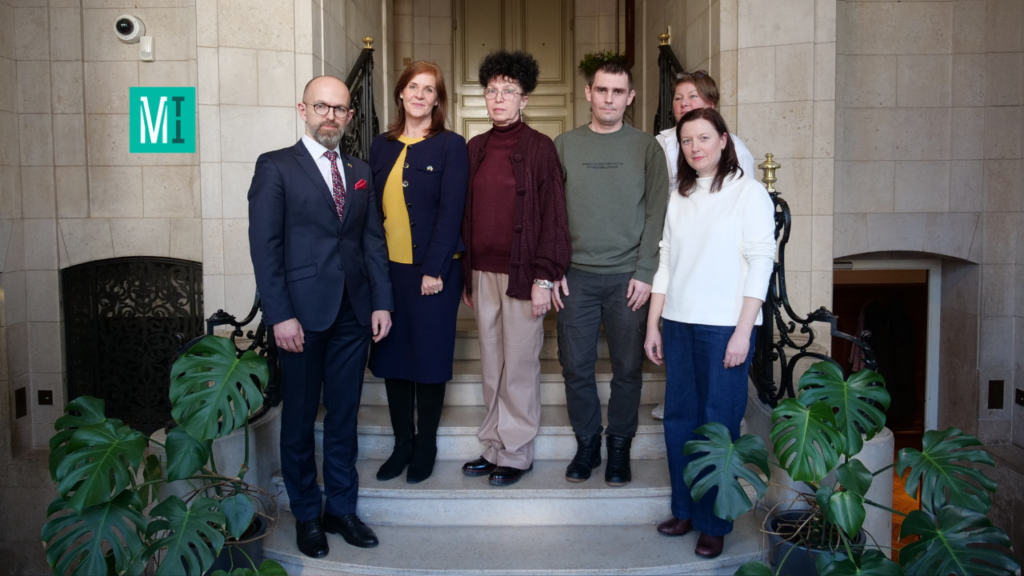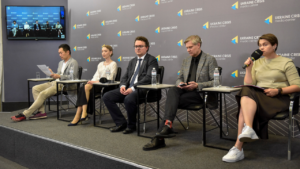Stories of Ukrainians who survived the occupation, abduction, and torture were told in The Hague

At the initiative of the British and Ukrainian embassies in the Netherlands and with the support of the Media Initiative for Human Rights, the Ukraine Witness Testimony Event was held in The Hague, during which witnesses to Russia’s war crimes in Ukraine told their stories of abduction and illegal detention.
The event was held in The Hague at the residence of the British Ambassador, Joanna Roper. It was dedicated to the civilian Ukrainians illegally and arbitrarily detained by Russia in the occupied territories of Ukraine. The meeting was attended by ambassadors from many countries and representatives of international organizations, including Kathryn Bomberger, Director of the International Commission on Missing Persons.

British Ambassador Joanna Roper delivers a welcoming speech to the Ukraine Witness Testimony Event participants. Photo: British Embassy in the Netherlands
Announcing the witnesses’ testimonies, Olha Byalyk, MIHR representative in The Hague, emphasized that civilian detainees are a separate category of victims of Russian aggression. They are not prisoners of war, and their arbitrary detention is prohibited by international humanitarian law. However, despite evidence of illegal detention of civilian Ukrainians, Russia does not provide any information about them, concealing their number and places of detention.
― We, as an organization, advocate for the creation of the special body at the national level and ask you, all the international partners, to re-enforce the mandate of the ICRC for getting access to the detainees and think of creating special monitoring missions of the places of detention, and to be acutely aware of the injustice, horrible conditions and immense suffering Ukrainian civilians deprived of freedom by the Russians go through. Today, you will hear first-hand accounts of two witnesses who went through Russian captivity.

Olha Byalyk, representative of the MIHR in The Hague. Photo: British Embassy in the Netherlands
It should be noted that the MIHR collects information on cases of detention of civilian Ukrainians by Russia, maintains lists of detainees, and carefully monitors their geographical location and conditions of detention. All this data is entered into the I-DOC system recognized by international legal institutions. The facts documented therein should help bring the perpetrators to justice in international courts, such as the International Criminal Court. The results of the work of the I-DOC are reflected in the investigation “Arbitrary detentions and capture of civilian hostages in the northern regions of Ukraine. Analysis of documented testimonies”. This is the first stage, which reveals the patterns of Russian crimes committed in the north of Ukraine in Kyiv, Chernihiv, and Sumy regions.
As of February 2024, the MIHR has identified 1505 civilians detained in the occupation, 51 places of detention in the occupied territories of Ukraine and 39 in the Russian Federation. The number of detainees may be several times higher. These are people of different ages and professions. Russia is illegally detaining Ukrainian men, women, minors, the elderly, and seriously ill people whose return to Ukraine is a matter of saving their lives.
― The Russian forces capture civilians as a method of intimidation of local communities, as a tool for their propaganda (to record ‘confession’ videos), and allegedly for prisoner swaps as they claim that they are not civilians but combatants. We used to call them civilian hostages because they were arrested and kept for no reason. Some of those people are accused of international terrorism and opposition to the Russian so-called special military operation and face blatantly unfair trials. Some are held without any charges, ― noted Olha Byalyk.
Lilia Pshenychna shared her own story of illegal detention with the international community. The woman was born and lived in Kherson. In peacetime, she worked at a garment factory. When the full-scale invasion began, she refused to leave her home and volunteered at a local church. There, 58 children from the orphanage found shelter. Ms. Lilia took care of the children until the Russian FSB kidnapped them and took them to Russia. On July 14, 2022, Russians came to Pshenychna’s apartment to search it. On the same day, they detained her and placed her in a pre-trial detention center in Kherson. The woman spent two months there. Here is what she said:
― There were six people in a double cell. We had nothing: no towels, no hygiene products, no soap, undergarments, and other clothing. Among us were two female police officers who were tortured with extreme cruelty. They were tasered, electrocuted, and beaten on the head. The Russians were constantly bringing new detainees. They were caught right on the street. Once, they brought a man of 72 years old. He was a goat herder and was accused of spying.
After the interrogations, I was also charged with espionage and threatened with a 20-year prison sentence. They said they would transfer me to Donetsk prison. And on the 60th day, the warden asked: “Pshenychna, do you want to go home?”I said: “Yes”. “Five minutes to get ready and get out of here,” he replied. After that, I couldn’t leave the apartment for a week. This fear paralyzed me. I was so ashamed of him, but I was afraid. Then I went back to church and helped again until the de-occupation of Kherson.

Lilia Pshenychna, a resident of Kherson, talks in The Hague about the occupation of the city and how the Russian occupiers illegally detained her. Photo: British Embassy in the Netherlands
The second witness who told his story is Artem Tatarbeev. He is a native of Mariupol. From 2012 to 2016, he served in the National Guard of Ukraine in a military unit renamed Azov after his discharge. At the time of the full-scale invasion, Artem was a civilian working as a driver. On June 20, 2022, while trying to take his family to the territory controlled by Ukraine, the man was detained at a filtration checkpoint as a former soldier. He was initially held in a detention center in Taganrog, where he was constantly beaten, including with electric shocks. The torture continued in penal colony No. 12 in Kamensk-Shakhtynsky, where he was placed in September 2022. And on December 20, 2023, Artem was released based on a deportation order with a 50-year ban on entering Russia.

Artem Tatarbeev, a resident of Mariupol, speaks in The Hague about Russian filtration camps and places of illegal detention of Ukrainian civilians in Russia. Photo: British Embassy in the Netherlands
At the end of the event, the witnesses were asked to tell what this visit to The Hague meant to them. Lilia Pshenychna said that for her, it is a place of hope for fair trials and that with the help of partners, Ukraine will be able to win. Artem Tatarbeyev, on the other hand, emphasized that he believes in the victory over Russia and thanked Europe for remembering Ukraine.







